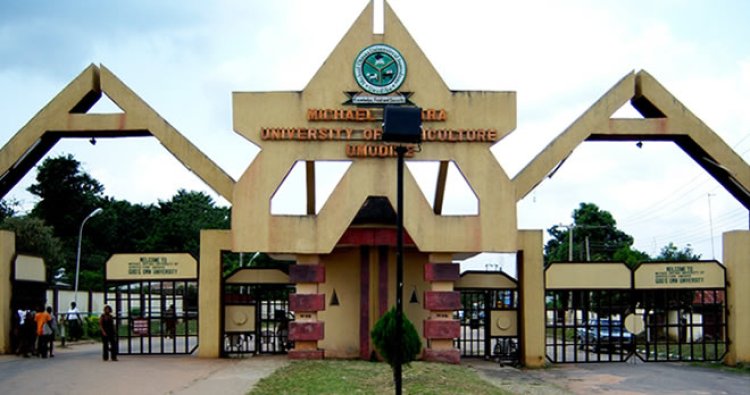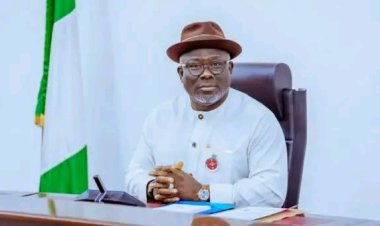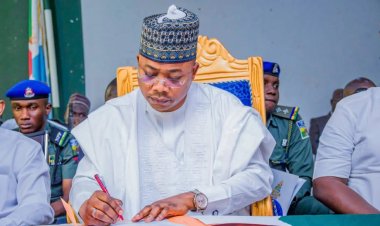Michael Okpara University of Agriculture Umudike Establishes Postgraduate School
Michael Okpara University of Agriculture Umudike (MOUAU), the institution has officially inaugurated its Postgraduate School, furthering its mission to contribute to self-sufficiency in food and fiber production in Nigeria through teaching, research, and extension. The establishment of the Postgraduate School reflects MOUAU's commitment to providing opportunities for advanced education in various fields related to agriculture and sciences.

Michael Okpara University of Agriculture Umudike (MOUAU), the institution has officially inaugurated its Postgraduate School, furthering its mission to contribute to self-sufficiency in food and fiber production in Nigeria through teaching, research, and extension. The establishment of the Postgraduate School reflects MOUAU's commitment to providing opportunities for advanced education in various fields related to agriculture and sciences.
The MOUAU, known for its dedication to agricultural research and education, admitted its first batch of undergraduate students in 1993. Recognizing the demand for advanced studies, the University Senate convened on February 10, 1995, to establish a Postgraduate Committee responsible for overseeing the development of postgraduate programs within the university. After careful consideration, it was determined that a modest postgraduate program should commence, with the first courses beginning in October 1995. The formal establishment of the Postgraduate School at MOUAU took place in January 1997, with the appointment of its inaugural Dean, Prof. I.O. Akobundu, at the helm. The current Dean is Prof. Okoro, Innocent Ajar. The first cohort of postgraduate students commenced their studies in May 1997.
RECOMMENDED: MOUAU announces 30th Founders Day Celebration

The MOUAU Postgraduate School offers a diverse range of programs in fields such as Agriculture, Applied and Basic Sciences, Management Sciences, and Education. The Postgraduate School, working closely with the University Senate, formulates policies governing postgraduate studies and supervises the progress of postgraduate students. At present, the Postgraduate School oversees programs leading to degrees of Master of Science (M.Sc.), Doctor of Philosophy (Ph.D.), and Postgraduate Diploma programs. The College of Agricultural Economics, Rural Sociology and Extension (CAERSE), the College of Applied and Natural Sciences (CASAP), the College of Communication and Societal Studies (CCSS), the College of Animal Science and Fisheries Technology (CAFST), the College of Engineering and Engineering Technology (CEET), the College of Natural Resources and Environmental Management (CNREM), the College of Agricultural and Science Education (CASE), the College of Management and Social Sciences (COLMAS), the College of Physical and Applied Sciences (COLPAS), and the College of Natural and Applied Sciences (COLNAS) are among the institutions offering specialized courses.
The diverse array of courses includes but is not limited to Agricultural economics, Agricultural extension, animal genetics and breeding, crop genetics and breeding, conservation of plant genetic resources, biotechnology, animal physiology, botany, chemistry, crop production, entomology, forestry and environmental management, fisheries science, food science and technology, forest food resources, agro-forestry, home economics management and utilization, plant pathology, poultry production and management, ruminant animal production and management, rural sociology and agricultural development, soil science and wood technology, physics, mathematics, biochemistry, microbiology, nutrition and dietetics, wildlife, Zoology, Clothing and Textiles, Women in Development, and more. The Postgraduate School benefits from a highly qualified academic staff that includes Professors, Associate Professors, Senior Lecturers, and Lecturers. Additionally, some departments enlist the expertise of guest lecturers and supervisors who are distinguished scholars from other Nigerian universities.
READ ALSO: MOUAU Pre-degree admission for 2023/2024 session
The inception of the Postgraduate School marked a historic moment for the MOUAU, aligning with the institution's mission to be a leading hub for education, research, and extension in agriculture and related disciplines. By offering advanced studies, MOUAU aims to foster an environment where students can further their knowledge and skills and contribute to the development of the agricultural sector in Nigeria. The bottom-to-up approach will guide research and extension efforts, ensuring that research and practices address the needs identified by farmers and the agricultural community. The University will promote a learning-by-doing approach, providing students with practical farming, forestry, fisheries, engineering, and scientific skills. To facilitate this, the University will establish teaching and research farms, demonstration and conservation plots, nurseries, plantations, parks, and gardens.
Access to modern infrastructure, equipment, and necessary materials for laboratory research and training will be provided. MOUAU will actively pursue collaborations with other universities, research institutes, agricultural enterprises, and international agricultural institutions to maintain effective linkages and promote knowledge sharing and research cooperation. The establishment of the Postgraduate School at MOUAU underscores the institution's commitment to education, research, and development in the field of agriculture and related disciplines. It signifies a pivotal moment in the University's continued journey towards academic excellence and societal progress.

 peace francis 1
peace francis 1 



